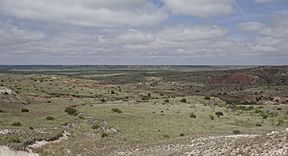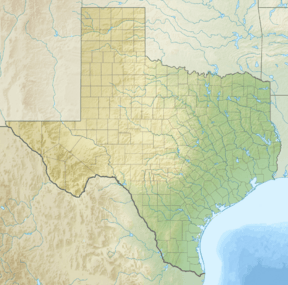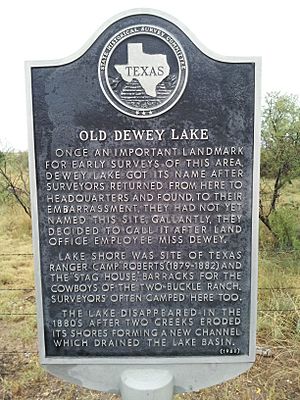Blanco Canyon facts for kids
Quick facts for kids Blanco Canyon |
|
|---|---|

View from the east side of Blanco Canyon
|
|
| Floor elevation | 2,667 ft (813 m) |
| Length | 34 mi (55 km) |
| Width | 10 mi (16 km) |
| Depth | 500 ft (150 m) |
| Geography | |
| Traversed by | U.S. Highway 82 |
| Rivers | White River |
Blanco Canyon is a large, deep valley found in Texas, USA. It was carved out by the White River over many years. This canyon is on the eastern edge of a flat area called the Llano Estacado.
The canyon stretches for about 34 miles (55 km) in a southeast direction. It starts in Floyd County and gets wider as it goes, reaching about 10 miles (16 km) across in Crosby County. The canyon also gets deeper, starting at about 50 feet (15 m) and reaching 300 to 500 feet (91 to 150 m) deep at its end. A smaller canyon, Crawfish Canyon, joins the White River from the west.
Blanco Canyon is one of several canyons carved into the Llano Estacado. Other famous canyons nearby include Yellow House Canyon, Tule Canyon, and Palo Duro Canyon.
Contents
History of Blanco Canyon
For a long time, people thought that the famous explorer Francisco Vázquez de Coronado might have camped in Blanco Canyon. This was finally confirmed in the 1990s. Coronado and his army likely stayed here twice in 1541 during their expedition.
The White River and the trees along its banks would have been a perfect spot for a camp. It offered both water and wood, which were hard to find in the area. Even though the river is mostly dry now because of water pumping, people used to say you could fish in it until the mid-1900s. The canyon still looks fertile, and cottonwood trees grow along the creek bed.
Important Events in the Canyon
On October 10, 1871, Blanco Canyon was the site of a major event. Colonel Ranald S. Mackenzie led a campaign against the Plains Comanches here. This event is known as the Battle of Blanco Canyon. During this same campaign, Mackenzie set up a supply camp called Anderson's Fort. This fort is now a recognized historic place.
After the Plains Indians moved to reservations, the first permanent white settlement in the area was established. This was in 1877 at Mount Blanco, which is on the east rim of the canyon. Early settlers, like Henry Clay Smith and his wife Elizabeth Boyle, were drawn to the area for the same reasons Coronado was: easy access to wood and water. This was very rare on the West Texas plains.
Modern Use of the Canyon
In 1948, a group of churches created the Plains Baptist Assembly in the canyon. It was meant to be a fun retreat for churches in the area. By 1986, this site had grown to 160 acres (0.65 km²) and included 65 buildings. Today, it is open all year round and hosts camps, retreats, and conferences.
The Floydada country club is also located within Blanco Canyon.
Accessing Blanco Canyon
You can reach Blanco Canyon by several roads. U.S. Highway 62 crosses the canyon near its beginning, running north to south. U.S. Highway 82 and Farm to Market Road 193 cross the canyon near its end, running east to west.
Where U.S. 82 crosses the White River, there is a special roadside park. This park has facilities and hiking trails, making it a great spot to stop and explore the canyon.
See also
 In Spanish: Cañón Blanco para niños
In Spanish: Cañón Blanco para niños
 | John T. Biggers |
 | Thomas Blackshear |
 | Mark Bradford |
 | Beverly Buchanan |



